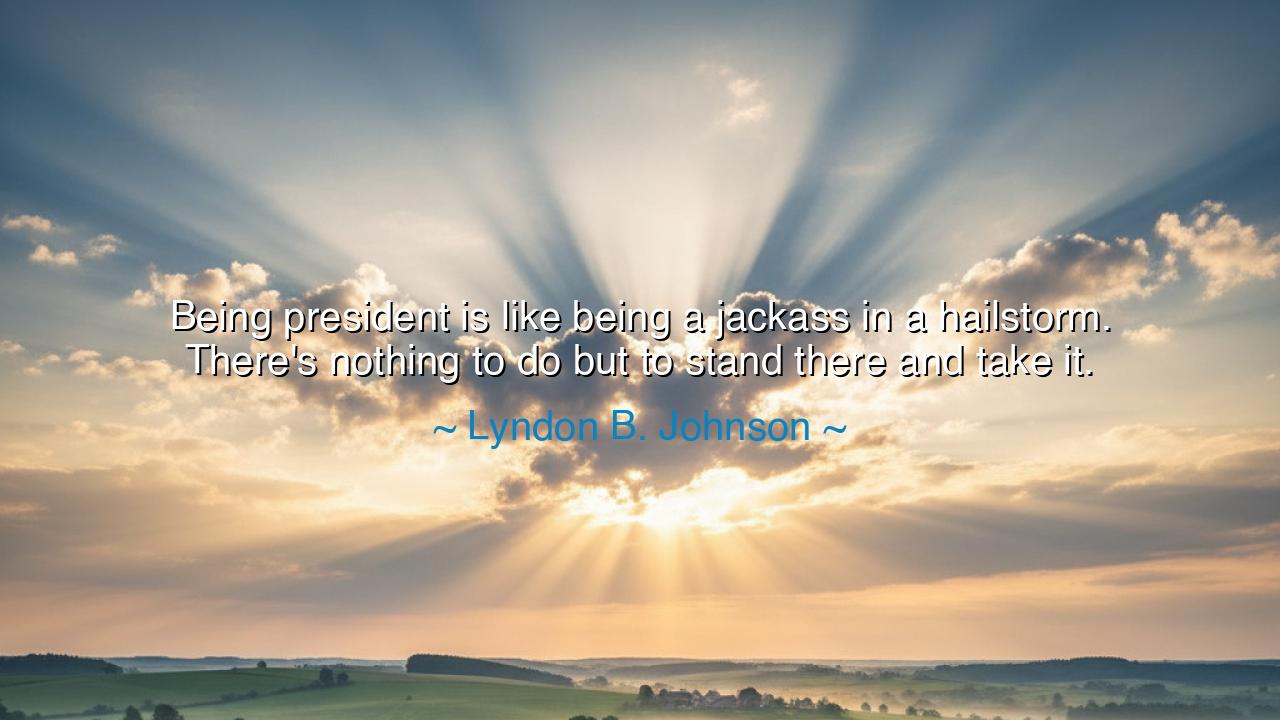
Being president is like being a jackass in a hailstorm. There's
Being president is like being a jackass in a hailstorm. There's nothing to do but to stand there and take it.






The words of Lyndon B. Johnson — “Being president is like being a jackass in a hailstorm. There’s nothing to do but to stand there and take it.” — carry the raw, earthy wisdom of a man who rose from the Texas plains to the highest office of the land. With the blunt tongue of his heritage, Johnson stripped away the grandeur of the presidency and laid bare its burden: unceasing attacks, storms without shelter, and the lonely endurance of leadership.
The meaning is both humble and profound. To be president is to be exposed, to stand in the open where every stone of criticism, every strike of crisis, falls upon you. Like a jackass caught in a hailstorm, there is no refuge, no escape, no moment of hiding. Power here is not luxury but trial; the office demands not comfort, but resilience — the ability to stand unmoved while the storm rages.
History proves Johnson’s words. He inherited the presidency in the shadow of tragedy, after the assassination of John F. Kennedy. The nation’s grief, the turmoil of civil rights, the fire of the Vietnam War — all descended upon him like hailstones. He could not outrun them, nor shield himself from their sting. Instead, he endured, pushing forward the Civil Rights Act of 1964, declaring a War on Poverty, even as the fury of Vietnam battered his presidency. His metaphor was not exaggeration but lived truth.
Yet within this image lies a lesson for all who would lead. Great responsibility does not allow for constant flight or avoidance. There are moments when the only noble course is to endure, to absorb the blows with dignity, and to hold fast until the skies clear. The hailstorm does not last forever, but while it falls, the leader must be the one who does not falter.
Let this wisdom endure: leadership is not crowns or applause, but the strength to stand when others would flee. Johnson’s rough metaphor, born of dust and storm, is a gift to every generation — a reminder that true greatness lies not in avoiding hardship, but in facing it head-on, weathering the hail, and carrying the people through the storm.






QCQuynnh Changg
Lyndon B. Johnson’s metaphor seems to convey the exhaustion and sense of futility that often accompanies leadership. Is this just the reality of high office, or does it speak to something more troubling about how we view political power? Should we reconsider the expectations we place on our leaders?
THDao thanh hang
This quote makes me think about how isolated political leaders must feel, especially when they're under attack from all sides. Is the role of president more about surviving the storm than actually steering the ship? What does this say about the personal sacrifices made by those in power?
HNHuy NT
Does Lyndon B. Johnson's quote reflect a broader truth about leadership in general? It seems to suggest that being in charge often means enduring hardship without the luxury of stepping away. How does this perspective compare to the more glamorous view of leadership many have?
AHAn Ha
It’s hard not to feel for someone in the president’s shoes after reading this. Being in the highest position of power often means taking the brunt of criticism, regardless of whether it’s deserved. Is there a way for leaders to avoid feeling like ‘a jackass in a hailstorm,’ or is that simply part of the job?
BTNguyen Bao Thy
This quote from Lyndon B. Johnson seems to capture the helplessness and frustration that comes with leadership. When you’re the president, you’re constantly under pressure from every direction, and sometimes it feels like there’s no way to avoid the storm. Is this an unfair metaphor, or is it an accurate representation of the role of high office?